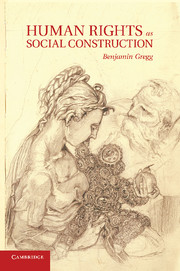Book contents
- Frontmatter
- Contents
- Acknowledgments
- Introduction
- Part I This-Worldly Norms: Local Not Universal
- Part II This-Worldly Resources for Human Rights as Social Construction
- Part III This-Worldly Means of Advancing the Human Rights Idea
- Part IV Human Rights, Future Tense: Human Nature and Political Community Reconceived
- 8 Human Rights via Human Nature as Cultural Choice
- 9 The Human Rights State
- Coda
- References
- Index
Coda
What Is Lost, and What Gained, by Human Rights as Social Construction
Published online by Cambridge University Press: 05 January 2012
- Frontmatter
- Contents
- Acknowledgments
- Introduction
- Part I This-Worldly Norms: Local Not Universal
- Part II This-Worldly Resources for Human Rights as Social Construction
- Part III This-Worldly Means of Advancing the Human Rights Idea
- Part IV Human Rights, Future Tense: Human Nature and Political Community Reconceived
- 8 Human Rights via Human Nature as Cultural Choice
- 9 The Human Rights State
- Coda
- References
- Index
Summary
This book proposes an approach to human rights based on a wholly naturalistic conception of the human being. If humans are wholly natural, then so is human morality, or so it would seem, for natural beings are not likely to possess a capacity for generating otherworldly artifacts. “Natural morality” refers to a repertoire of biologically based mechanisms of cognition and emotion. Throughout the individual's life, natural morality is open to learning through experience, by reasoning about experience, and in socialization, culture, and politics (even as very young children already display some signs of moral cognition and behavior, although they have had very little experience and cultural learning). As a product of evolution, natural morality is an anthropological constant in the sense that, whatever it is, it characterizes all human individuals, across the entire span of individual and group histories, cultural preferences, and normative convictions. This wholly naturalistic conception of the human being comports with the social constructionist approach that guides this book. And as social constructions, human rights may well build on aspects of natural morality.
Still, one wonders: Is something lost by viewing human rights in these terms? For example, do we humans perhaps want or even need human rights to be the sort of theological and metaphysical entities that they cannot be? Such a need would not surprise; after all, we cannot evade our constitutional weaknesses and limitations, those which the young Marx well captured: “Religious suffering is the expression of real suffering and at the same time the protest against real suffering. Religion is the sigh of the oppressed creature, the heart of a heartless world, as it is the spirit of spiritless conditions” (Marx 1967:250). The otherworldly appeals of religion and metaphysics reflect something of the psychological fragility of the intrinsically needy and sensitive human being exposed throughout life to tragedies and disappointments large and small, to failures personal and institutional, to injustice and disregard, when finally “our little life / Is rounded with a sleep.” From this perspective, my approach surely entails multiple losses: loss of the psychological feeling of security provided by belief in a supernatural source or foundation; loss of the impression of freedom from all the weaknesses of human nature and all the limitations of human understanding; loss of the conviction that justice will prevail finally because theological forces either beyond this world, or metaphysical truths underlying it, guarantee inexorable justice.
- Type
- Chapter
- Information
- Human Rights as Social Construction , pp. 233 - 236Publisher: Cambridge University PressPrint publication year: 2011

